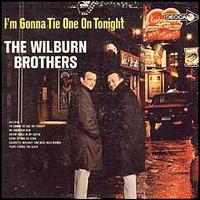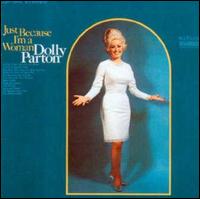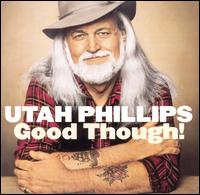July 15, 2006
More "self" talk, from country crooners to city slickers
Back in November I wondered in two posts about the origins of the jocular expression of self-address, "So I said to myself, 'Self...'" It turned out to be a surprisingly difficult task to trace the history of this turn of phrase. Despite many people's vague recollections of hearing it used by various comedians of the '50s and '60s, I was originally only able to find examples in print from the '80s on. The first breakthrough was made by Lance Nathan, who found an example of self-talk in the song "Play Something Sweet (Brickyard Blues)," composed by Allen Toussaint in 1973 and recorded by Three Dog Night the following year. Now two country songs have emerged that take the usage firmly back to the 1960s, and another lead suggests that it might go back to the 1940s, in the comic performances of Spike Jones and the City Slickers.
 The
earliest
example of self-talk I've
found so far is from the 1965 song "I Had One Too Many," composed by
Lee McAlpin and performed by The Wilburn Brothers on their booze-soaked
album I'm
Gonna Tie One On Tonight. Here are the relevant lyrics (which can
be heard in this
audio clip):
The
earliest
example of self-talk I've
found so far is from the 1965 song "I Had One Too Many," composed by
Lee McAlpin and performed by The Wilburn Brothers on their booze-soaked
album I'm
Gonna Tie One On Tonight. Here are the relevant lyrics (which can
be heard in this
audio clip):
Drove all around downtown, I'll admit it.
And I said to myself, "Self, take a left, that'll git it."
Then a big Cadillac cruised down the street, and I hit it.
And that really did it.
I had one too many when one was plenty for me.
 Don Blaheta directed my attention to another country
song using the expression a few
years later, Dolly Parton's "I'll Oil Wells Love You," on her 1968
album Just
Because I'm A Woman. Dolly sings (in words co-composed with her
uncle Bill Owens):
Don Blaheta directed my attention to another country
song using the expression a few
years later, Dolly Parton's "I'll Oil Wells Love You," on her 1968
album Just
Because I'm A Woman. Dolly sings (in words co-composed with her
uncle Bill Owens):
I met a man in Texas,
And oh, he was so fine,
And I said to myself,
"Self, I'm gonna make him mine!"
So now we know that the use of vocative self in a jokey interior dialogue was established in country-and-western songwriting circles by the mid-'60s. This suggests that it stems from traditions of comic storytelling, perhaps originating in the rural South. This sort of oral usage is difficult to document, unless it happens to have made its way onto recordings of comedians who adopted the expression. Correspondents have recalled hearing self-talk from standup comics as varied as Brother Dave Gardner, Flip Wilson, Tommy Smothers, and Bill Cosby, but so far I haven't had any luck finding any recorded examples of the expression from them.
 I did get a
good
tip from Tony Delgado, who pointed me to
"Moose Turd Pie," a tall
tale recorded by Bruce "Utah" Phillips on his 1973 album Good Though! It's worth
hearing
in its entirety (audio available here,
full text here),
but the relevant bit goes as follows:
I did get a
good
tip from Tony Delgado, who pointed me to
"Moose Turd Pie," a tall
tale recorded by Bruce "Utah" Phillips on his 1973 album Good Though! It's worth
hearing
in its entirety (audio available here,
full text here),
but the relevant bit goes as follows:
I looked down at that meadow wafer,
And I said to myself,
"Self, I'm gonna bake up a big moose turd pie."
The story is said to have folkloristic roots predating the Utah Phillips recording, so this got me to thinking that perhaps the "Self..." expression was disseminated along with the tall tale in its various retellings. As it happens, there's a "Moose Turd Pie" expert out there: Saul Broudy, whose 1982 dissertation at the University of Pennsylvania was entitled, "The Effect of Performer-Audience Interaction on Performance Strategies: 'Moose-Turd Pie' in Context." I contacted Broudy, who in turn got in touch with Utah Phillips himself. As Broudy reports:
He told me he first heard the "self" bit done by Spike Jones & the City Slickers at the Hippodrome Theater (a vaudeville house) as a child in his home town of Salt Lake City around 1946 (Phillips' stepfather distributed films etc to theaters in the Intermountain area, so it was natural he would attend such venues).
A vaudeville origin was actually one that I had originally considered, and Spike Jones and his crew seem as likely a propagator of the expression as any. As Thomas Pynchon wrote in the liner notes to Spiked! The Music of Spike Jones, the City Slickers satirized hillbilly music and dialect humor but were themselves mainly from rural backgrounds:
Early on, in '43, in a Radio Mirror interview, Spike described his band as "a subtle burlesque of all corny, hill-billy bands." A great many of these City Slickers who were so hep to the jive had in fact themselves come originally from out in the middle of America, places like Thief River Falls and Oilton and Muncie -- the Nilsson Twins hailed from Wichita, Sir Frederick Gas from Kansas City, George Rock from Farmer City, Illinois, and Spike himself from the farm and railroad environment of California's Imperial Valley.
So perhaps one of the City Slickers carried self-talk from somewhere in the heartland, then brought it to a popular audience via Spike Jones' radio appearances and stage performances. We may never know the origin of the "Self..." expression, but one thing is clear: it's as American as mom and apple pie.
[Why stop at the 1940s when we can take things all the way back to the first century? Jeff Russell writes in with a Biblical forerunner:
"And he spake a parable unto them, saying, The ground of a certain rich man brought forth plentifully: And he thought within himself, saying, What shall I do, because I have no room where to bestow my fruits? And he said, This will I do: I will pull down my barns, and build greater; and there will I bestow all my fruits and my goods. And I will say to my soul, Soul, thou hast much goods laid up for many years; take thine ease, eat, drink, and be merry. But God said unto him, Thou fool, this night thy soul shall be required of thee: then whose shall those things be, which thou hast provided? So is he that layeth up treasure for himself, and is not rich toward God."
(Luke 12:16-21, King James Version)
In the original Greek, that would be: "και ερω τη ψυχη μου ψυχη εχεις πολλα αγαθα...", or in transliteration: "kai ero te psuche mou psuche echeis polla agatha..."]
Posted by Benjamin Zimmer at July 15, 2006 04:17 PM